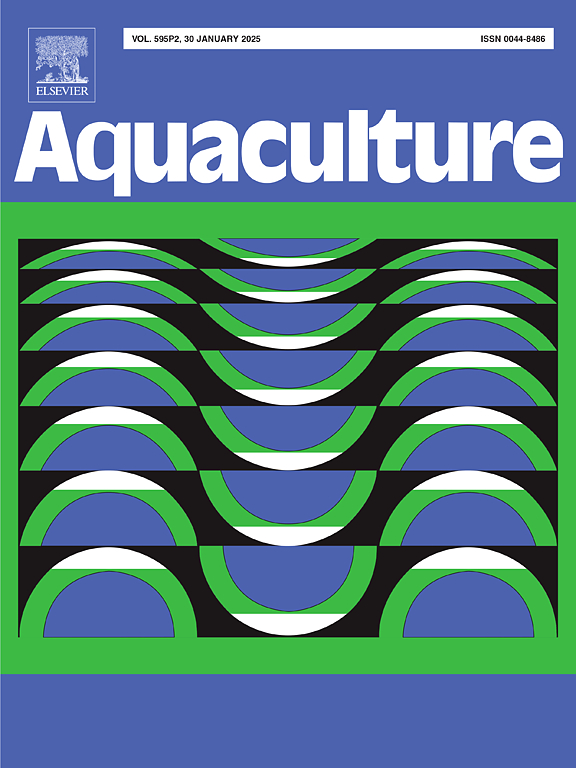提高普通章鱼(octopus vulgaris)的福利:实时定量PCR (qPCR)监测章鱼寄生负荷的无创策略的建立
IF 3.9
1区 农林科学
Q1 FISHERIES
引用次数: 0
摘要
福利生物标志物的识别对于水族馆系统中普通章鱼的适当维护,以及为该物种建立新的可持续水产养殖,确保动物福利至关重要。这一战略要求制定技术和程序来监测和分析儿童的健康状况。本研究建立了一种基于粪便样本定量实时PCR (qPCR)的无创检测方法,并与光镜分析相比较,验证了该方法对胃肠道章鱼总球虫寄生虫的检测和定量。该方法可快速、廉价、简便、可靠地获得养殖动物体内寄生虫存在情况的信息,并对其寄生虫负荷进行量化。所建议的方法对个体的影响最小,允许早期发现寄生虫感染,从而确保他们的福利。此外,还建立了章鱼按蚊感染程度(低、中、高)的评价参考体系。这些特点使这种非侵入性方法成为操作福利指标(OWI)的优秀候选方法。本文章由计算机程序翻译,如有差异,请以英文原文为准。
Promoting welfare in the common octopus, Octopus vulgaris: Development of a non-invasive strategy for monitoring Aggregata octopiana parasite load by real-time quantitative PCR (qPCR)
The identification of welfare biomarkers is essential for the proper maintenance of the common octopus in aquarium systems, as well as for the establishment of a new sustainable aquaculture for this species, ensuring animal welfare. This strategy requires the development of techniques and procedures to monitor and analyze their health status. In the present work, a non-invasive method based on the study of faecal samples using quantitative real time PCR (qPCR) has been developed and validated by comparison with light microscopy analysis, to detect and quantify the gastrointestinal coccidian parasite Aggregata octopiana. This method allows for obtaining rapid, cheap, easy and reliable information on the presence of the parasite in aquarium-maintained animals, as well as quantifying their parasite load. The proposed methodology generates the minimal impact on the individuals, allowing for an early detection of the parasite infection, and, therefore, ensuring their welfare. In addition, a reference system for estimating the degree of A. octopiana infection (low, medium, and high) has been established. These characteristics make this non-invasive methodology an excellent candidate as an Operational Welfare Indicator (OWI).
求助全文
通过发布文献求助,成功后即可免费获取论文全文。
去求助
来源期刊

Aquaculture
农林科学-海洋与淡水生物学
CiteScore
8.60
自引率
17.80%
发文量
1246
审稿时长
56 days
期刊介绍:
Aquaculture is an international journal for the exploration, improvement and management of all freshwater and marine food resources. It publishes novel and innovative research of world-wide interest on farming of aquatic organisms, which includes finfish, mollusks, crustaceans and aquatic plants for human consumption. Research on ornamentals is not a focus of the Journal. Aquaculture only publishes papers with a clear relevance to improving aquaculture practices or a potential application.
 求助内容:
求助内容: 应助结果提醒方式:
应助结果提醒方式:


